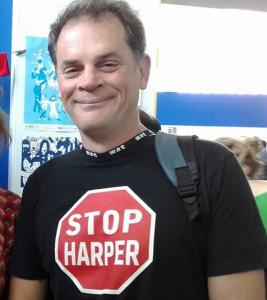 Michel Lambert at the 2015 IGFThe Internet Governance Forum (IGF) is a unique multistakeholder forum which allows civil society organisations to discuss with the public and private sectors on policy issues related to internet governance.
Michel Lambert at the 2015 IGFThe Internet Governance Forum (IGF) is a unique multistakeholder forum which allows civil society organisations to discuss with the public and private sectors on policy issues related to internet governance.
The 2015 IGF took place as Alternatives and APC are together executing a project called Building a culture of online human rights and digital security though the capacity building and networking of human rights defenders in the Maghreb-Mashrek region.
In this context, my approach at the IGF was to follow two of the main themes discussed during the event: Internet and human rights and Cybersecurity and trust, which we saw as directly related to our developing work on digital security as a tool to support human rights defenders.
Alternatives’ objectives during the IGF also included using the forum as an opportunity to better know some of the key players of the sector with the aim of interesting them in our work.
Finally, I was hoping to take part in discussion on the topic of the Internet Social Forum (ISF) project, so as to try to understand better the ideas behind it and eventually to decide if Alternatives, as an important actor within the World Social Forum (WSF) process, should or should not also join the ISF initiative.
Internet and human rights
I was able to participate in some workshops/presentations on the internet and the human rights. While I have to admit I learned a lot, I must also say that what I learned was a bit different from what I was looking at learning during the IGF. Somehow, it seems to me that the deep issues of human rights are, still, mostly of concern to actors from civil society. To my surprise, it even seemed that the very notion of multistakeholder governance may not be achieving, perhaps, as much consensus as I was expecting. Since the UN Human Rights Council recognised that access to the internet and the freedom of expression that accompanies it are fundamental rights, human rights issues on the internet often stop at the single question of physical access to the internet. Although most actors involved are talking about the need to protect an open, reliable, secure, stable and inclusive internet, the issues around social transformation behind simple access to the information shared through the internet often appear like basic contradictions. Access to the internet is increasingly reduced by private and state sectors to access to services imposed by large internet multinationals, dictating their laws, saturating the bandwidth with applications without social benefits and requiring proprietary software, and controlling traffic.
Particularly in the French language, there is very little content on the fundamental issues of inequality in terms of digital access. Surely, there a lot of work for APC at that level.
Freedom of information is a human right. It is also part of the fundamental human right of freedom of expression which makes it possible to seek, receive and share, regardless of frontiers, information and ideas through any media whatsoever. Freedom of information is also a prerequisite for informed public participation in governance and the democratic process.
In recent years, restricting the flow of information has raised many concerns. Issues such as increased surveillance, private security and data protection of journalists’ sources and human rights defenders have aroused a great deal of debate. But again, from the IGF, I am left with the impression that the idea that the internet could be used to protect human rights is relegated behind other apparently more urgent issues such as privacy issues, cyber security, net neutrality and other so-called emerging issues.
Cybersecurity and trust
The sessions I attended on cybersecurity mentioned a lot the necessity of boosting global trust, promoting international stability of the internet and enhancing cooperation in global internet governance. And without neglecting these issues, it seems to me that this discourse applies mainly to commerce and economy and less to privacy and individual rights.
In the context of increasing government surveillance of the internet in most countries around the world, specifically against the rights of rights activists, the issue of the right to use privacy tools (like encryption) may not be seen as important in the balance. Strong encryption should remain legal. The right to anonymity for journalists, activists, human rights defenders, gender and LGBT campaigners and others should be defended.
Conclusions
An easy conclusion is to say that I still have a lot to understand about the IGF process and the issues it raises. I am also still unclear about what to believe of the reality of the multistakeholder governance process.
On a more “day-to-day” level, though, my physical presence in João Pessoa was very useful as I was able to meet many important players of the sector, including representatives from the Canadian institutions with whom Alternatives was unable to speak during the last 10 years because of the climate of fear imposed by our previous Conservative government.
I also discussed a lot with some of the proponents of the Internet Social Forum. Although the start of the project was probably not the best (and there are many concerns on the part of various organisations), I believe the process must be followed by APC in order to help strengthen the project and give a stronger voice to civil society actors in the other global and multistakeholder processes.